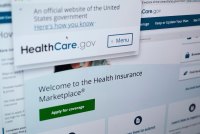Latest KFF Health News Stories
Obamacare Sign-Ups Drop, but the Extent Won’t Be Clear for Months
Experts say Affordable Care Act sign-up data won’t be clear until people who were enrolled have paid — or haven’t paid — their new, often much higher, premiums.
When the Doctor Needs a Checkup
The physician workforce is aging fast, and some hospitals now require that older clinicians undergo testing for cognitive decline. Many have resisted.
Doctors Increasingly See AI Scribes in a Positive Light. But Hiccups Persist.
Patients say they find AI summaries of doctor visits user-friendly, but it’s not clear if their appointments are improving. In any case, doctors appear to be embracing the high-tech innovation.
Cada vez más médicos ven con buenos ojos a los asistentes de IA. Pero aún hay tropiezos
Los médicos están considerando a estos asistentes de IA ambiental como una herramienta revolucionaria que les permite concentrarse en sus pacientes en lugar de en el teclado.
Sick of Fighting Insurers, Hospitals Offer Their Own Medicare Advantage Plans
Breakups between insurers and health systems, on top of plan cuts, left more than 3.7 million Medicare Advantage enrollees facing a tough choice last year: find new insurance or new doctors. But hospital systems say their Advantage plans can avert such upheaval, giving patients peace of mind.
California Ends Medicaid Coverage of Weight Loss Drugs Despite TrumpRx Plan
Low-income Californians who use Wegovy and similar medications for weight loss lost their coverage at the start of the new year, with officials advising diet and exercise instead. California and other states say the drugs are too costly, even as the Trump administration announces plans to lower prices.
Older Americans Quit Weight Loss Drugs in Droves
In some studies, half of patients stopped taking GLP-1s within a year despite the benefits, citing the expense and side effects.
Advertisements Promising Patients a ‘Dream Body’ With Minimal Risk Get Little Scrutiny
While federal officials say they are cracking down on misleading drug ads, cosmetic surgery remains a “buyer beware” market.
Medical Bills Can Be Vexing and Perplexing. Here’s This Year’s Best Advice for Patients.
As the crowdsourced investigative series from KFF Health News approaches its eighth anniversary, “Bill of the Month” offers its top takeaways of 2025 to help patients manage, decipher, and even fight their medical bills.
Criminally Ill: Systemic Failures Turn State Mental Hospitals Into Prisons
There has been a steep rise in the share of people with severe mental illnesses being sent to state psychiatric hospitals on court orders after being accused of serious crimes. The shift has all but halted patients’ ability to get care before they have a catastrophic crisis.
Medicaid Health Plans Step Up Outreach Efforts Ahead of GOP Changes
Even as President Donald Trump and GOP lawmakers say the One Big Beautiful Bill Act targets waste, fraud, and abuse, Medicaid health plans are hosting events across the U.S. to prevent low-income families from losing health insurance and food benefits next year.
Guns Marketed for Personal Safety Fuel Public Health Crisis in Black Communities
During the covid pandemic, gun marketers told many Americans they needed firearms to defend against criminals and protesters. Then firearm deaths mounted rapidly in racially segregated and low-income neighborhoods, according to federal data.
Las verificaciones de antecedentes para comprar armas aumentaron 60% de 2019 a 2020, año en que el gobierno federal declaró la emergencia sanitaria por covid.
Ese mismo año, más de 45.000 personas murieron por violencia con armas de fuego.
Sticker Shock: Obamacare Customers Confront Premium Spikes as Congress Dithers
With subsidies that give consumers extra help paying their health insurance premiums set to expire, lawmakers are again debating the Affordable Care Act. The difference this time: It’s happening in the middle of ACA open enrollment.
How Delays and Bankruptcy Let a Nursing Home Chain Avoid Paying Settlements for Injuries and Deaths
Genesis HealthCare’s bankruptcy case in Dallas will allow the nursing home chain to avoid paying millions of dollars it promised for residents who were injured or died while in its care. Families say bankruptcy nullifies one of the main ways to hold nursing home owners accountable for poor care.
What the Air You Breathe May Be Doing to Your Brain
Studies increasingly find links between higher concentrations of certain pollutants and the prevalence of dementia.
Trump’s HHS Orders State Medicaid Programs To Help Find Undocumented Immigrants
Federal health authorities have taken the “unprecedented” step of instructing states to investigate certain individuals on Medicaid to determine whether they are ineligible because of their immigration status, with five states reporting they’ve received more than 170,000 names collectively.
A Ticking Clock: How States Are Preparing for a Last-Minute Obamacare Deal
Even if Congress strikes a deal soon to extend more generous Affordable Care Act subsidies, the prices and types of ACA plans available could change dramatically. Unprecedented uncertainty and upheaval could cloud this year’s open enrollment season, which begins in most states on Saturday.
Why Brittle Bones Aren’t Just a Woman’s Problem
More men are now living long enough to develop osteoporosis. But few are aware of the risk, and fewer still are screened and treated.
At Least 170 US Hospitals Face Major Flood Risk. Experts Say Trump Is Making It Worse.
As a warming climate intensifies storms, KFF Health News has identified more than 170 U.S. hospitals at risk of significant and potentially dangerous flooding. Climate experts warn that the Trump administration’s cuts leave the nation less prepared.

























